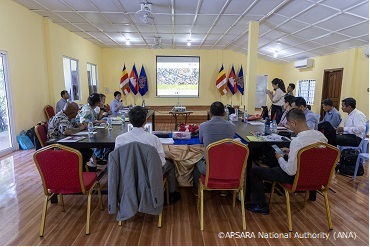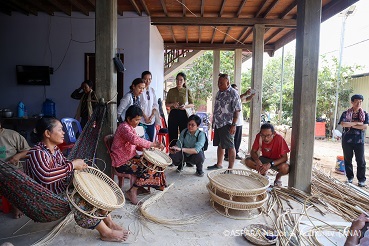NEWS
12/04/2024
Workshop in Siem Reap, Cambodia, was held on 18-19 March 2024
In the IRCI project, ‘Research on ICH Contribution to SDGs: Intangible Cultural Heritage for Sustainable Cities and Communities’, three case studies have been conducted in the Angkor region of Cambodia, George Town of Malaysia, and the Marshall Islands to contribute to the achievement of SDGs through community development leveraging intangible cultural heritage (ICH). A workshop for this project was held in Siem Reap, Cambodia on 18-19 March 2024, as an opportunity to report and discuss the results of the research conducted in FY 2023.
The workshop was co-hosted by IRCI and the APSARA National Authority (ANA) in Cambodia, which has been collaborating on the project. Other collaborators participated in the workshop were the George Town World Heritage Incorporated in Malaysia, who has been undertaking a case study in George Town, and the team of Pasifika Renaissance and the Waan Aelõñ in Majel (Canoes of the Marshall Islands), who has been conducting a case study in the Marshall Islands, as well as an officer from the Ministry of Culture and Fine Arts of Cambodia, who has been working in the field of ICH.
On the first day, each collaborator presented his/her research findings and had intensive discussions, which mainly focused on the role of tangible and intangible cultural heritage in the community. Particularly, participants emphasized that ICH is not meant to protect tangible heritage but is an integral part of cultural heritage, and that the interaction between the tangible and intangible is important. They also affirmed that such perspectives are necessary for the maintenance and sustainable development of communities.
On the second day, participants visited and interviewed communities of the rattan craft producers near the Angkor monuments, where ANA has been conducting research. The rattan work has been actively practiced in this region due to the abundance of rattan raw materials. This excursion provided a valuable opportunity for each participant to exchange views on the issues and possibilities for further case studies through experiencing the area of ANA’s case study.

Presentation session of the workshop (Photo ©ANA)

Interview to the rattan craft practitioners (Photo ©ANA)
- ARCHIVE
- CATEGORY
- Research Data Collection
- Creation of Research Forum
- SDGs
- Climate change
- Natural hazards
- COVID-19 Pandemic
- Endangered ICH
- Post-conflict
- Legal systems
- Documentation
- Conferences/Meetings
- Seminars
- Symposiums/Forums
- Workshop/Working sessions
- Field research
- Information
- Visits
- Publications
- YouTube
- C2Centre
- UNESCO
- Cooperation-with-Sakai-city
- Governing Board Meetings
- Others



